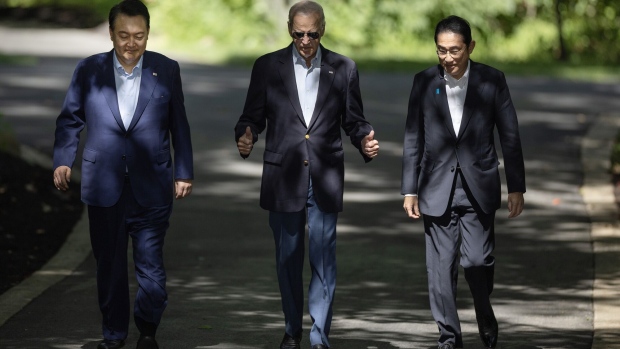Aug 22, 2023
Biden’s Landmark Summit With Asian Allies Further Isolates China
, Bloomberg News

(Bloomberg) -- President Joe Biden’s security pledges with once feuding neighbors Japan and South Korea at historic talks bolstered US military power in Asia. That’s made China look increasingly isolated in its own backyard.
The landmark summit at the Camp David presidential retreat last week saw Japan’s Fumio Kishida and South Korea’s Yoon Suk Yeol pledge to hold annual hold meetings with the US, establish a shared military hotline and strengthen ballistic missile defense cooperation.
Those military agreements came as the White House pressures both Asian nations to support its tech curbs on China, amid a US push to clip President Xi Jinping’s efforts to increase the nation’s military and economic might. China’s Foreign Ministry on Monday criticized the summit, saying it would only “start division and confrontation.”
Biden’s deepening diplomacy in Asia shows how the US is committed to strengthening relationships with longstanding allies to entrench its global influence. Beijing’s own regional diplomatic outreach has had limited success, particularly as military tensions increase with Taiwan: When China’s top diplomat Wang Yi hosted a trilateral forum last month, Japan and South Korea’s foreign ministers just sent video messages.
As Beijing’s had diplomatic spats with both nations this year and conducted military exercises near their territories, there’s little sign their own once-annual leaders’ conference will take place for the first time since the pandemic. An official at South Korea’s Foreign Ministry said this week they were still working to organize the trilateral meeting.
“China is the true father of this deal,” Richard McGregor, at the Lowy Institute in Sydney, said of Biden’s landmark summit this month, adding that concerns over North Korea and Russia also played a role in motivating South Korea and Japan to join the agreement.
On the prospect of Beijing holding its own three-way talks, he added: “China seems unable to reassure their neighbors in any real way, let alone seduce them.”
Last week’s summit was the second trip for both Kishida and Yoon to the US this year, and came just months after Biden traveled to Japan for the Group of Seven summit. By contrast, Xi hasn’t met his Japanese or South Korean counterparts this year, or sat down with Biden, instead watching from the sidelines as the three nations form stronger ties.
In that absence of dialogue, China’s relationship with South Korea has deteriorated, with tensions spilling over this year when the Chinese ambassador in Seoul criticized South Korea for embracing pro-US policies, sparking a tit-for-tat exchange.
China summoned Japan’s ambassador in Beijing to lodge a “solemn” protest after the G-7 communique made reference to China’s “militarization activities” and intentions toward Taiwan — the self-ruled democracy Beijing claims as its own territory and that Biden has said he’d defend if invaded. Recently China has also been very critical of Japan’s plan to discharge nuclear wastewater into the Pacific Ocean.
The Foreign Ministry in Beijing on Tuesday called the plan “selfish and irresponsible’ and then called in Japan’s ambassador to protest the decision, which was approved by the International Atomic Energy Agency.
The statement from Camp David echoed some of those concerns, criticizing Chinese actions in the South China Sea and calling for a peaceful solution to the Taiwan issue. The three leaders also pledged to fight “economic coercion” and supply chain disruptions, in veiled swipes at China.
The agreement to cooperate on missile defense was the latest sign Seoul is changing its diplomatic approach to Beijing. In 2016, China punished South Korea economically to try to stop it from deploying a US missile defense system known as Thaad to defend against North Korea’s arsenal. China objects to the shield over concerns its powerful radar would allow spying on its own missile systems.
Beijing’s subsequent three conditions for mending ties were that Seoul would not join any US-led regional missile defense system, not form a trilateral alliance with the US and Japan, and not commit to any additional Thaad deployments.
Yoon’s conservative government has since said it’s not bound by those pledges made by its progressive predecessor, improved ties with Japan including by hosting Kishida in Seoul in May, and now looks to be moving toward closer defense ties with both Tokyo and Washington.
The high-profile statement from the presidential retreat pledging to cooperate on a “striking array of issue areas” was intended as a signal to Beijing and Pyongyang, said Adam Liff, visiting chair of Japanese politics and foreign policy at Georgetown University. The commitment to consult also reflected an “unprecedented degree of shared concerns about regional and global challenges,” he added.
If Japan and South Korea are still wedded to their trilateral with China this year, Beijing will now likely “go through an agonizing time before it reaches a decision,” as attending could legitimize their agreement with the US, said Moon Chung-in, a former South Korean national security adviser.
“The folks in Beijing will be very much suspicious,” said Moon, who has served in administrations seeking rapprochement with Pyongyang. “China is not likely to take a permissive or tolerant posture on South Korea — a tough time awaits.”
--With assistance from Sangmi Cha, Sam Kim and Dan Murtaugh.
(Updates with China calling in Japanese ambassador in 10th paragraph.)
©2023 Bloomberg L.P.







